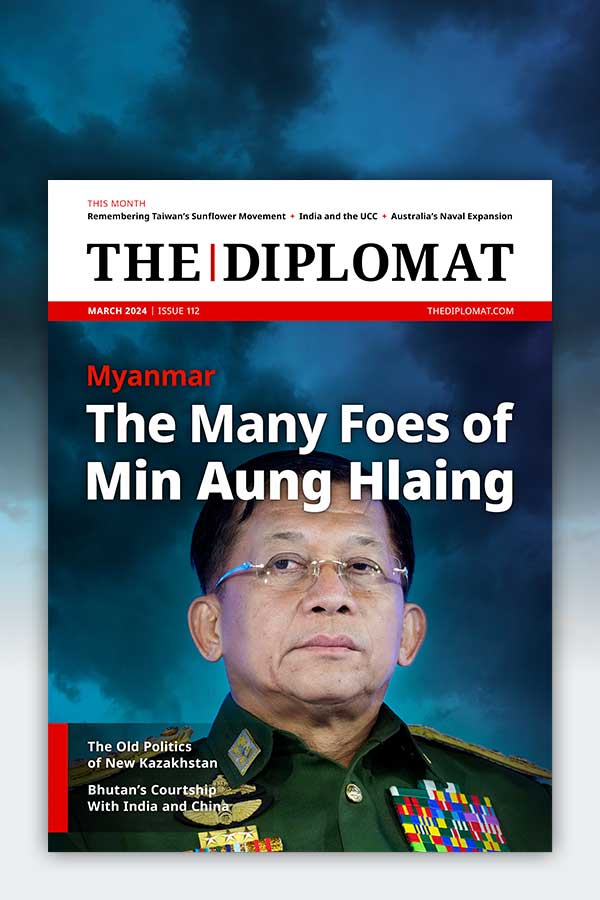| Welcome to the latest issue of Diplomat Brief. This week our top story explores U.S. involvement in an attempted coup in Cambodia during the Cold War. We also have an interview with Frank Maracchione, a Ph.D. candidate in the Department of Politics and International Relations at the University of Sheffield, about Chinese interest in and scholarship on Central Asia. |
| Story of the week | ![[object Object]](https://thediplomat.com/diplomat-brief/2024/vol13/images/feature.jpg?v=1) | Diplomacy When the US Tried to Orchestrate a Coup in CambodiaWhat Happened: In the 1950s, fear of the spread of communism colored every foreign policy decision made by the United States. That fear led to a disastrous coup attempt meant to get rid of Cambodia’s Prince Norodom Sihanouk, who was viewed as leaning toward China, and toward communism. In an article for The Diplomat, historian Matthew Jagel describes the little-remembered event, and its lingering impact on the U.S. position in Southeast Asia today. Our Focus: Washington and its allies in South Vietnam and Thailand watched with alarm as Sihanouk expanded ties with China while refusing offers to join the U.S. alliance network. Eventually, they decided Sihanouk had to go. “In late 1958, Sam Sary, an ostracized Cambodian politician, met with Thai and South Vietnamese officials, Son Ngoc Thanh, and CIA officials,” Jagel recounts. “At this meeting the secret bilateral committee made the decision to overthrow the prince.” Then-U.S. President Dwight D. Eisenhower himself was informed of the plot, in which the CIA played an active role. But Sihanouk caught wind of the attempt and was able to rout the conspirators before they could make their move. What Comes Next: The Dap Chhuon Affair, as it became known, was a disaster. It not only failed to remove Sihanouk, but it actively alienated him from the United States. Jagel describes the coup attempt as “a classic case of Cold War hubris on the part of the U.S., in which a poorly supported and executed plan went awry, and pushed Cambodia closer to the perceived enemies of the United States.” The episode in 1959 laid the foundation for a tense Cambodia-U.S. relationship that has persisted ever since. Read this story |
| Behind the News | INTERVIEW Frank MaracchioneFrank Maracchione, a Ph.D. candidate in the Department of Politics and International Relations at the University of Sheffield, and author of a recent quantitative analysis of Chinese scholarship on Central Asia, on how Russian studies colors China’s scholarship on Central Asia: “The relevance of Russia in Chinese-language research on Central Asia has been inversely proportional to China’s prominence in the region and has therefore declined over time. This might imply some sort of emancipatory trend in Chinese thinking about its role in Central Asia.” Read the interview |
| This Week in Asia | Northeast Asia North Korea Reiterates Japan’s Interest in a SummitA month after mentioning North Korea’s willingness to meet with Japanese Prime Minister Kishida Fumio, Pyongyang issued a statement claiming that Kishida wants to meet with Kim Jong Un “as soon as possible.” Pyongyang has consistently rebuffed outreach from South Korea and the United States since 2019; its receptive signals toward Japan make for an interesting contrast. However, with the abduction issue remaining a major point of disagreement, an actual Kim-Kishida summit still looks unlikely. Find out more | South Asia Nepal’s New FM Visits ChinaIn early March, Nepal’s Prime Minister Pushpa Kamal Dahal dropped one coalition government for another, reuniting with his on-again, off-again allies in the Communist Party of Nepal-Unified Marxist Leninist. In an early sign of the new government’s foreign policy priorities, Deputy Prime Minister and Foreign Minister, Narayan Kaji Shrestha is in China on his first foreign visit from March 24-April 1. Nepal’s communist parties have typically been more friendly to China – and less friendly toward India – while in power. Find out more | Southeast Asia Myanmar Begins Forced Conscription DriveMyanmar’s military is enlisting its first batch of civilians into the armed forces, in a bid to make up for battlefield losses on fronts across the country. On February 10, the military junta announced that it would begin enforcing the People’s Military Service Law, with the first batch of 5,000 draftees set for enlistment in April. Under the law, which was passed in 2010, men between the ages of 18 and 45 and women aged 18-35 can be drafted into the armed forces for two years, a period extendable to five years during national emergencies. The drive has set off panic, prompting thousands of prospective draftees to flee to Thailand, or join groups fighting against the military regime. Recent weeks have also seen the assassination and resignation of junta administrators tasked with implementing the deeply unpopular policy, which seems set to increase further the public’s loathing of an already hated regime. Find out more | Central Asia Central Asians in Terrorism Spotlight After Russia AttackIn the aftermath of the horrific attack on a concert hall in the outskirts of Moscow, Russian authorities charged four Tajik citizens as the perpetrators, and detained several others. Although President Putin is erroneously pointing the finger at Ukraine, ISKP has claimed responsibility. Meanwhile, Kyrgyzstan warned its citizens to avoid travel to Russia. The attack – and the involvement of ethnic Central Asians – is likely to exacerbate already difficult circumstances for Central Asian migrant workers in Russia. Find out more |
| Visualizing APAC |  | Rohingya refugees stand on their capsized boat before being rescued in the waters off West Aceh, Indonesia, March 21, 2024. See the full picture |
| Word of the Week | Diplomacy विश्वगुरुVishwaguru, a Sanskrit phrase meaning “world leader.” The Modi government has adopted the term to highlight its ambitions for India’s global status. Find out more |
|  |

![[object Object]](https://thediplomat.com/diplomat-brief/2024/vol13/images/feature.jpg?v=1)

